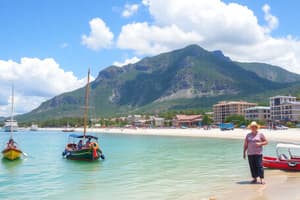Podcast
Questions and Answers
What is the primary purpose of leisure tourism?
What is the primary purpose of leisure tourism?
- To explore cultural heritage
- To seek medical care
- To conduct business meetings
- To relax and recreate (correct)
Which type of tourism specifically involves responsible travel to natural areas?
Which type of tourism specifically involves responsible travel to natural areas?
- Adventure Tourism
- Eco-Tourism (correct)
- Cultural Tourism
- Medical Tourism
How does tourism contribute to local economies?
How does tourism contribute to local economies?
- It increases environmental degradation
- It decreases local job opportunities
- It generates revenue through spending (correct)
- It drains local resources
Which social impact is often associated with tourism?
Which social impact is often associated with tourism?
What is a significant environmental challenge posed by tourism?
What is a significant environmental challenge posed by tourism?
Which trend in tourism focuses on authentic local experiences?
Which trend in tourism focuses on authentic local experiences?
Which organization is responsible for promoting sustainable tourism on a global scale?
Which organization is responsible for promoting sustainable tourism on a global scale?
What challenge does economic volatility pose to tourism?
What challenge does economic volatility pose to tourism?
Which type of tourism involves visiting sacred sites?
Which type of tourism involves visiting sacred sites?
What is a common misconception about eco-tourism?
What is a common misconception about eco-tourism?
Flashcards are hidden until you start studying
Study Notes
Definition of Tourism
- The act of traveling for leisure, business, or other purposes.
- Involves the movement of people to destinations away from their usual environment.
Types of Tourism
- Leisure Tourism: Traveling for relaxation and recreation.
- Business Tourism: Travel for work-related purposes, such as meetings or conferences.
- Cultural Tourism: Exploring the culture, heritage, and arts of different places.
- Eco-Tourism: Responsible travel to natural areas, conserving the environment and improving the well-being of local people.
- Adventure Tourism: Involves activities like hiking, climbing, and extreme sports.
- Medical Tourism: Traveling to another country for medical care or procedures.
- Religious Tourism: Visiting sacred sites or participating in religious events.
Economic Impact
- Generates revenue for local economies through spending on accommodation, food, and attractions.
- Creates jobs in sectors such as hospitality, transport, and entertainment.
- Contributes to local development and infrastructure improvements.
Social Impact
- Promotes cultural exchange and understanding among diverse populations.
- Can lead to the preservation of cultural heritage and traditions.
- May result in overcrowding and strain on local resources.
Environmental Impact
- Can lead to habitat destruction, pollution, and depletion of natural resources.
- Promotes conservation efforts through eco-tourism initiatives.
- Encourages awareness of environmental issues among tourists and locals.
Trends in Tourism
- Growth of sustainable and responsible travel.
- Increased use of technology for booking and travel planning (mobile apps, online platforms).
- Rise of experiential travel focusing on authentic local experiences.
- Popularity of regional and local tourism due to global events (e.g., pandemics).
Challenges Facing Tourism
- Economic volatility affecting travel budgets and demand.
- Environmental degradation and climate change impacting destinations.
- Political instability and health crises (e.g., pandemics) affecting travel safety and regulations.
Key Organizations
- World Tourism Organization (UNWTO): UN agency responsible for promoting sustainable and universally accessible tourism.
- International Air Transport Association (IATA): Trade association for airlines promoting safe, secure, and economical air travel.
Conclusion
- Tourism is a multifaceted industry with significant economic, social, and environmental impacts.
- Understanding its various types, trends, and challenges is crucial for sustainable development and responsible travel practices.
Definition of Tourism
- Travel involves movement for leisure, business, or other purposes.
- Engages individuals away from their usual surroundings.
Types of Tourism
- Leisure Tourism: Focuses on relaxation and recreational activities.
- Business Tourism: Involves travel for work-related activities, including meetings and conferences.
- Cultural Tourism: Centers on exploring diverse cultures, heritage, and artistic expressions.
- Eco-Tourism: Advocates responsible travel in natural settings, enhancing local well-being while conserving the environment.
- Adventure Tourism: Engages participants in thrilling activities such as hiking, climbing, and extreme sports.
- Medical Tourism: Involves traveling abroad for healthcare services and procedures.
- Religious Tourism: Connects travelers to sacred sites and religious events.
Economic Impact
- Generates significant revenue for locales through tourist spending on accommodation, food, and attractions.
- Creates employment opportunities in hospitality, transportation, and entertainment sectors.
- Contributes to the enhancement of local infrastructure and community development.
Social Impact
- Fosters cultural exchange and encourages understanding among diverse groups.
- Supports the preservation of cultural heritage and local traditions.
- May lead to overcrowding, causing pressure on local resources and infrastructure.
Environmental Impact
- Tourism activities can result in habitat destruction, pollution, and overuse of natural resources.
- Eco-tourism initiatives promote environmental conservation and responsible practices.
- Raises awareness about environmental challenges among tourists and local populations.
Trends in Tourism
- Increasing emphasis on sustainable and responsible travel choices.
- Growing utilization of technology for travel booking and planning, including mobile applications and online platforms.
- Shift towards experiential travel that prioritizes authentic local engagements.
- Rise in interest for regional tourism driven by global events such as pandemics.
Challenges Facing Tourism
- Economic fluctuations hinder travel budgets and demand for services.
- Climate change and environmental degradation threaten destination viability.
- Political instability and health crises, including pandemics, create uncertainties and new travel regulations.
Key Organizations
- World Tourism Organization (UNWTO): UN agency dedicated to promoting sustainable and accessible tourism globally.
- International Air Transport Association (IATA): Trade organization advocating for safe and economical air travel for airlines.
Conclusion
- Tourism is a complex sector with notable economic, social, and environmental effects.
- Awareness of different tourism types, trends, and associated challenges is vital for promoting sustainable practices and responsible travel.
Studying That Suits You
Use AI to generate personalized quizzes and flashcards to suit your learning preferences.




